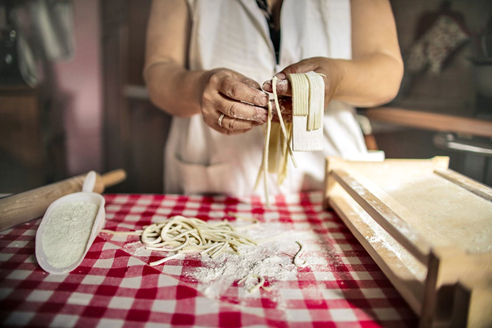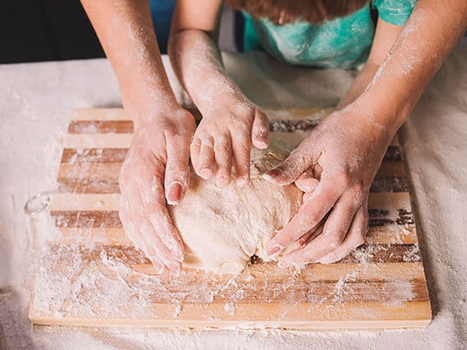Feeding our mental health
- Nicole Mariani
- May 27, 2020
- 5 min read
Updated: Mar 23, 2023
Cooking without a doubt nourishes your psychological well-being; it soothes the soul and the mind” — Chef Zipora Einav
For some people cooking is a boring routine, it requires time and effort and, sometimes, the tiredness takes over and they turn straight to takeaways and food deliveries for dinner.
However, for others cooking is not only a way to cuddle family and friends by providing a bountiful feast, but also a moment of creativity, learning new skills, relaxing of the mind, and, if everything goes well, the satisfaction of creating a flavourful dish. This has become even more important at these times of social isolation.
As an Italian (scientist), I grew up in a culture where the kitchen and dining room are the core of the house, and where food is the main topic of discussion for everyone.
When I think about my grandmother, “la nonna” as we say in Italian, I often picture her in the kitchen cooking something new and delicious while listening to the radio. The kitchen was her studio and she was the lead artist.
She was from Emilia Romagna, a region of Italy, home of fresh pasta such as tortellini, cappelletti, tagliatelle and lasagne. Ever since I was little she used to call me and my siblings in to the kitchen to help her out and to give us all her secret tips for making a great homemade fresh pasta that will make your day (I am sorry, I can’t reveal them.. It’s a family secret!).
I used to love eating homemade meals, especially desserts, rather than preparing them by myself. I know, I know, I have been spoiled by my nonna and mum, but who could blame me?
My culinary experience started with baking cakes. Before I knew it, the kitchen became my own world and time seemed to stop while I was getting lost in my baking for hours during my adolescence days.
Slowly, cooking became a combination of creativity, mindfulness, a sense of control, and a way to reminisce on childhood memories. I soon realised that cooking for myself and others can have a huge benefit to my mental well-being.
While cooking, I needed to be focused, weighing the ingredients precisely, stiring regularly, adjusting the seasoning, monitoring the process, and enjoying the beautiful sights and transitioning smells it unleashes. The entire experience helped clearing my mind from everyday life problems, without forgetting that a treat is coming at the end.
In 2016 I moved to London. From that moment on, cooking has not only been a help for my mental health but has also allowed me to reproduce the smells and flavors of my home. Be it a cake, lasagne or a roast, the smell and process of baking and cooking brings the same sense of comfort as a hug from my mum, and it brings me back to when I would, impatiently, and with eyes full of admiration, look at my nonna cooking.
Regardless of our education, origins, relationship status, social standing, age or sex, everyone has an every-day relationship with food, whether it is needing it, loving it, avoiding it, sharing it or craving it.
It is something that we all have in common and that binds us together.
I found myself writing this blog during the COVID-19 pandemic, with the lack of flour and yeast, and while looking at the many pictures of homemade food on social media: it’s been difficult to not notice that many of us have found cooking and baking of great help to get past this difficult period. Thanks to the possibility of sharing home cooking pictures online and participating in online challenges, allowing us to share what we have made in a symbolic way, cooking is also helping us to connect with our friends and family.
So, why is everyone baking and cooking during this pandemic? Is it because we have more time, or is it also because it is helping our mental health?
In recent years, cooking has been used to help people relieve stress, and in the therapeutic pathway for mental health conditions such as depression or anxiety. A study published in the Journal of Positive Psychology found that activities like cooking can make people more enthusiastic about things the following day. In fact, cooking therapy (together with other art therapies) has a powerful mind-body impact, since it stimulates all our five senses (touch, sight, hearing, smell and taste).
““Cooking is like painting or writing a song. Just as there are only so many notes or colours, there are only so many flavours — it’s how you combine them that sets you apart””
— CHEF WOLFGANG PUCK
As discussed a few years ago in The Wall Street Journal, therapists and psychologists believe that cooking and baking are part of a type of therapy identified as “behavioral activation”. This therapeutic intervention has been used to overcome depression by focusing on activities which increase goal-oriented behaviors, reducing the tendency to procrastinate.
Cooking classes, in fact, are now recommended by therapists as additional help to treat depression and anxiety, as well as eating disorders, attention deficit hyperactivity disorder and addictions. Culinary therapy involves the whole task, from cultivating a garden and planning grocery lists to preparing meals, and the process has been shown to relieve stress, improve focus, and develop social skills and sensory awareness.
A recent example is a participant from a famous UK TV show: John Whaite. He is a baker and winner of The Great British Bake Off 2012. But what you may not know is that he was diagnosed with bipolar disorder in 2005.
John shared how baking helped him in stabilising his mood by providing easy tasks to focus on, in an interview with the BBC. He said:
“When I’m in the kitchen, measuring the amount of sugar, flour or butter I need for a recipe or cracking the exact number of eggs. I am in control.”
— JOHN WHAITE
For an individual suffering from a psychiatric condition, the sense of control is very important, and it gives the feeling of regaining themselves. It is a milestone in the therapeutic pathway.
Cooking can also have highly positive effects in connecting you to people, and creating a sense of community which helps you to feel like you’re providing a useful and appreciated service, as the culinary art therapist Michal AviShai said during an interview with the Huffington Post.
Finally, in addition to the benefits of the process of cooking, the food itself activates the hormone system that helps to regulate our mood and an overall sense of well-being, as explained in our previous blog by Rachel Kelly. Food stimulates the production of different hormones such as dopamine, the brain’s “pleasure chemical” that rewards your choice to eat a pizza. Other hormones that are regulated by food intake are ghrelin, a hormone produced mainly in the stomach in order to stimulate the appetite, with possible link with mood disorders; and cortisol, which tends to increase blood sugar levels when we are hungry, and it has been associated with the response to stress.
We can conclude that cooking has at least 5 benefits: 1. It gives a reward at the end 2. It helps the brain to stay healthy 3. It activates creativity that makes you feel good 4. It is an altruistic gesture when cooking for others 5. It saves money (!)
So, if you think this could be helpful for you but you’re not sure where to start, don’t be scared. The skill of cooking takes practice and all professionals as well as good home cooks have had years of practice to refine their technique.
Start small, use beginner’s cookbooks or online videos to help you.
Plus, you don’t have to be the best chef to get the positive effects of cooking. Don’t underestimate yourself, you might be able to make your favourite dish in no time!

Header Image
Source: Pexels








